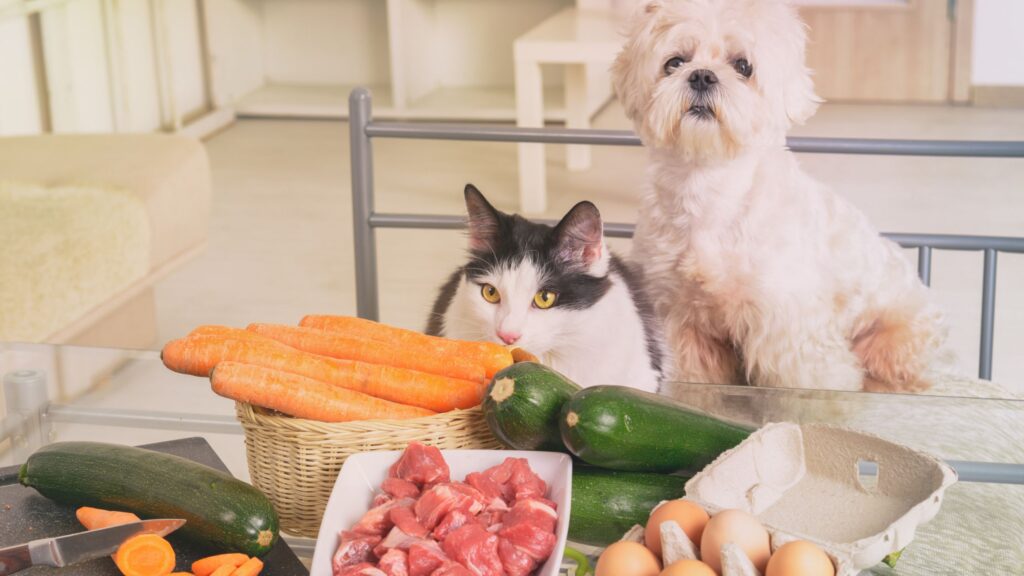
As a pet parent, ensuring your furry friend gets the right nutrition is one of the most important aspects of their care. While commercial pet food is often convenient, some pet owners opt for homemade meals to have greater control over ingredients and ensure their pet is getting wholesome, fresh food. However, creating balanced, nutritious homemade pet food requires a deep understanding of your pet’s specific dietary needs. In this blog, we’ll explore the nutritional requirements for dogs and cats and offer tips on how to formulate healthy homemade meals for your pets.
Nutritional Requirements of Pets
Nutritional Needs of Dogs
Dogs are omnivores, meaning they can eat both plant and animal products. However, their diet must be balanced to support their overall health, energy levels, and longevity.
Key Nutrients for Dogs:
- Protein: Essential for muscle growth and tissue repair. Proteins should come from high-quality sources like chicken, beef, turkey, lamb, and fish. Another source of protein is egg.
- Fats: Provide energy, support brain function, and help with skin and coat health. Healthy fats should come from sources like fish oil, chicken fat, or flaxseed oil.
- Carbohydrates: While dogs don’t require carbohydrates in large amounts, they can provide energy. Carbs from sources like sweet potatoes, brown rice, and oats can be beneficial.
- Vitamins & Minerals: Dogs need essential vitamins (A, D, E, K, B-complex) and minerals (calcium, phosphorus, potassium) for immune function, bone health, and metabolism.
- Fiber: Helps with digestion. Fiber can come from fruits, vegetables, and whole grains.
What to Include in Homemade Dog Food:
- Meat or fish: Lean meats like chicken, turkey, and beef, or fatty fish like salmon.
- Vegetables: Carrots, green beans, pumpkin, and spinach are dog-friendly and packed with nutrients.
- Carbohydrate sources: Brown rice, quinoa, or sweet potatoes.
- Healthy fats: A small amount of olive oil or fish oil for omega-3 fatty acids.
- Supplements: Consider adding calcium or bone meal, and a multivitamin for dogs to ensure they’re getting all necessary nutrients.
Nutritional Needs of Cats
Cats are obligate carnivores, meaning they rely almost entirely on animal-based protein for their nutrition. Their diet must be protein-rich with moderate amounts of fat and minimal carbohydrates.
Key Nutrients for Cats:
- Protein: Cats require a high-protein diet from animal sources. Chicken, turkey, beef, and fish are excellent options.
- Fats: Healthy fats, especially omega-3 and omega-6 fatty acids, are crucial for skin and coat health. Fish oil is an ideal source.
- Taurine: An essential amino acid for cats, taurine is found in meat and fish. Without it, cats can develop serious health issues, including heart disease.
- Vitamins & Minerals: Cats need vitamin A, D, E, K, and B-complex vitamins, along with minerals like calcium and phosphorus for healthy bones and teeth.
- Low Carbohydrates: Cats don’t process carbs well and should have very little in their diet. Rather, concentrate on high-grade fats and proteins.
What to Include in Homemade Cat Food:
- Meat or fish: Chicken, turkey, beef, lamb, or fatty fish like salmon.
- Organs: Cats benefit from liver and other organs, which provide essential vitamins like A and D.
- Minimal vegetables: While cats don’t require vegetables, small amounts of fiber-rich vegetables like pumpkin can help digestion.
- Supplements: Consider taurine, calcium, and vitamin supplements to ensure a well-rounded diet. You may also need to add fish oil or omega-3 supplements.
How to Formulate Homemade Pet Food Considering the Nutritional Requirements of Pets?
Creating healthy homemade pet food requires balance. A lack of essential nutrients can lead to deficiencies, while excesses can also harm your pet’s health. Here’s a step-by-step guide to formulating homemade pet food for your dogs and cats:
1. Understand Portion Sizes
Each pet’s caloric needs depend on factors such as their age, weight, activity level, and breed. Consult with your veterinarian to determine the ideal portion size for your pet, ensuring that the homemade meals meet their energy requirements.
2. Use a Variety of Protein Sources
Protein should form the base of your homemade recipes. Vary the protein sources to provide your pets with different amino acids. Rotate between chicken, turkey, beef, and fish for both dogs and cats. For cats, it’s crucial to include animal protein since plant-based sources lack taurine.
3. Include Healthy Fats
Add healthy fats to your pet’s food, but be mindful of the amount. Use sources like fish oil, flaxseed oil, or small amounts of coconut oil to ensure their coat remains healthy and shiny.
4. Add Vegetables and Carbs
For dogs, including vegetables and carbohydrates can provide energy and fiber. Use vegetables like carrots, spinach, and pumpkin, and whole grains like brown rice or oats. For cats, keep carbs to a minimum, focusing on a protein-centric diet with very limited plant ingredients.
5. Supplements
Because homemade pet food may not provide all the nutrients your pets need, adding supplements is important. Calcium supplements are particularly crucial if you aren’t feeding your pet raw bones. Additionally, vitamin and mineral supplements help cover nutritional gaps.
6. Avoid Toxic Foods
Be sure to avoid ingredients that are toxic to dogs and cats, including:
- Chocolate
- Grapes and raisins
- Onions and garlic
- Avocados
- Certain nuts (e.g., macadamia nuts)
Making homemade pet food can be a rewarding way to ensure your dog or cat is getting fresh, nutritious meals. However, it’s important to keep the unique nutritional requirements of pets in mind and consult with your vet to ensure their diet is properly balanced. By focusing on the right proteins, healthy fats, and essential vitamins and minerals, you can create delicious, healthy meals that keep your pets happy and healthy for years to come.
Frequently Asked Questions
- Is homemade pet food better than commercial pet food?
Ans: Homemade pet food allows you to control ingredients and avoid additives, but it requires careful planning to ensure your pet gets all essential nutrients. Consulting a vet is crucial to maintaining a balanced diet.
- What are the key nutrients my pet needs in homemade food?
Ans: Dogs need proteins, fats, carbohydrates, and vitamins, while cats, as obligate carnivores, require high-quality animal proteins, fats, and taurine. Both need appropriate vitamins and minerals.
- How can I make sure my pet’s homemade food meets the nutritional requirements of pets?
Ans: It’s important to include a variety of protein sources, healthy fats, and supplements like calcium and vitamins. Regular vet check-ups help ensure that homemade meals meet your pet’s nutritional requirements.
- Are there any foods I should avoid when making homemade pet food?
Ans: Yes, certain foods are toxic to pets, including chocolate, grapes, raisins, onions, garlic, and avocados. Always check for pet-safe ingredients before preparing homemade meals.
